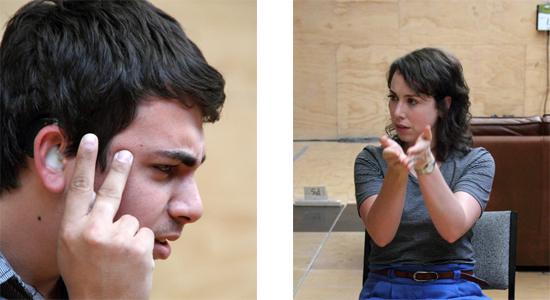Director Julian Meyrick speaks to Paul Galloway about working on the UK smash-hit
Tribes, the new play by British writer Nina Raine, leaps into action as if from a pistol shot. The lights come up on a family at the table in their North London home in the middle of a normal – normal to them – dinner discussion. Loud, bickering, badgering, bruising. Funny, too. The father Daniel leads the cacophony, mixing argument, opinion and insult, but almost everyone gives as good they get. This family doesn’t hold back. Bam! – Raine just lets the audience have it.
‘I have to say that the first thirty-five minutes of the play, from an acting and directing point of view, will be hard work,’ Meyrick says. ‘The audience are still trying to work out what colour the set is and here you have the actors hammering away at each other. But the dramatic beginnings of the play must slowly emerge out of the fireworks at the start. Out of the smoke and noise, an audience must learn certain things to carry them through to the rest of the story. It’s a terribly exciting challenge.’

Actors Sarah Peirse and Brian Lipson rehearse Nina Raine’s blistering dialogue
‘I didn’t know Nina’s work much,’ he says. ‘I only knew [her previous play] Rabbit, really. But when I read Tribes I felt she was, to an extent, part of the movement in British writing that always interested me. The Monsterists were a group of young writers, a few years ago now, all writing in different styles, trying to bring the edginess you’d find in many of the smaller theatres and opening it up for a larger stage. This is what Tribes does: it’s a relatively small play but casts an epic shadow. The contrast to make is with a play such as Orphans, which I saw at Red Stitch the other night. I mean, it is a terrific play but by no means a mainstage drama. It’s a small, intense experience. But Tribes, I have to say, has a series of movements in it, which really defy simple analysis. It seems to unfold in a very organic way from a small portrait that focuses on the family to incorporate all sorts of feelings and ideas and everything, the whole box and dice.’
The play is thick with dramatic ironies, the central one being that, in this family of non-listeners, one son is deaf. Meyrick, who has always enjoyed skiing off-piste with his casting choices (notably a couple of seasons ago with his indigenous cast in Pinter’s The Birthday Party), had to find a young deaf actor to play the son, Billy. After a long search, hearing-impaired actor Luke Watts was selected for the role.

Actors Luke Watts and Alison Bell using sign language in rehearsals
‘It was the aspect that made me say yes to the project straight away,’ he says. ‘I would probably have said yes anyway because of its excellence as a play and it’s well within the body of work that I have done for MTC, but I’m always looking for ways that the casting envelope can be pushed. I like to combine actors who know the MTC oeuvre with those who come in from the outside. They create great conversations and chemistry.’
At various points in this play about communicating and connecting with others, Raine asks for electronic subtitles, as you might see at a special performance for the hearing-impaired, to support the action. It’s a technique that Meyrick thinks will be effective because the writer is very strict with its use.
‘She uses these theatrical aids only so far as it will serve the drama. And as I’m saying that, my heart warms to her! Because that has been an issue over the past ten or fifteen years, how some writers – though obviously writers have not been the chief culprits, some directors have been worse – have often used these effects as a substitute for drama. Yet in Tribes they are absolutely right. They are one of the many means by which the story gets told. And this is why, were I wearing one, I would take my hat off to her.’
Tribes by Nina Raine plays at the Sumner Theatre from 4 February to 14 March.
Published on 3 February 2012